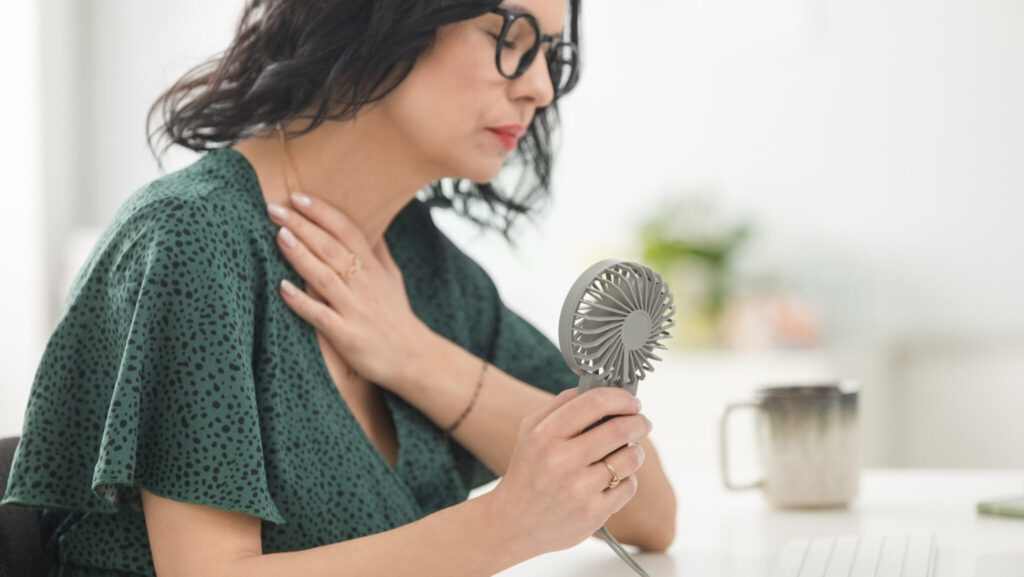
Brain fog, weight gain, mood swings, lower libido, painful intercourse, night sweats, hot flashes and insomnia — these are among the symptoms that affect about 85 per cent of women during menopause, varying in intensity and combination.
For some, these struggles create a bond and a willingness to talk about what has long been taboo.
“Am I comfortable talking to my husband about it? Not really. I don’t think he would fully understand,” said Trish Kinsey, 59, a restorative dental hygienist who attended Menopause Unveiled: The Silent Epidemic & Oral Health on Sept. 16 in Etobicoke, Toronto.
“With my high-school girlfriends and close friends, I feel comfortable — honestly, they’re probably the only ones I can talk to. That’s why it’s about time we started speaking openly about this.”
Menopause is generally confirmed when menstruation stops for 12 consecutive months. In Canada, the average age of menopause is 51. However, women can experience menopause starting at 45 up to 55. Additionally, some reports even warn of younger women — in their 30s or early 40s — experiencing symptoms from early or surgical onset, often in silence. One in 100 women in Canada will enter menopause before age 40, and one in 1,000 before 30.
“It’s very much a silent topic,” Kinsey added.
As a dental professional, she said she has seen signs of menopause in patients’ mouths and has observed colleagues managing its effects.
Dry mouth, or xerostomia, is one of the more common oral changes. One study found that about half of women in menopause reported dry mouth, compared with 32 per cent of men in the same age range.
“Some talked about it, others seemed tired, and some were judged because they didn’t have the same ‘get up and go’ that they once had … They were still valuable team members, but at times I saw them being treated differently,” Kinsey said.
Related: Dentist candidly reflects on perimenopause, offers solutions to unique challenges
Growing awareness in dentistry
The Etobicoke event, attended by several dozen women, reflects a broader trend: rising awareness among patients and practitioners of menopause’s impact on health, including oral health.
Globally, the menopause market — products and services aimed at managing symptoms — was valued at US$17.79 billion in 2024 and is projected to reach US$24.35 billion by 2030, growing at a compound annual growth rate of 5.42 per cent.
Mainstream media has also begun to highlight the connection. Last September, Associated Press medical journalist Laura Ungar reported on menopause and its impact on oral health.
Her feature arrived a year after Delta Dental’s 2023 Senior Oral Health and Menopause Report: Breaking the Stigma. The report found that 84 per cent of women 50 and older were unaware that oral symptoms they experienced could be linked to menopause.
Related: How menopause nearly cost me my life—and why dentistry needs to pay attention
Doctors and dentists catching up
Dr. John Viviano, a dentist at Sleep Disorders Dentistry RLC, who was one of the speakers at the Etobicoke event, told Oral Health Group that menopause is rarely covered in dental curricula, if at all. Even many obstetricians and gynecologists, he added, rely on outdated views of menopause transition.
Indeed, a 2023 survey in BMC Women’s Health found only 31.3 per cent of U.S. OB-GYN residency programs had a formal menopause curriculum, though many program directors said they wanted standardized resources.
Viviano also pointed to research bias, noting that tools for screening sleep apnea are often designed around “typical” male symptoms, which may leave women underdiagnosed. He said education about menopause must begin with dentists and their teams so they can engage patients in thoughtful, empathetic conversations.
“Reduction in hormones such as estrogen and progesterone result in a host of changes that go far beyond oral health,” Viviano explained. Common oral changes include increased risk of periodontal disease, even when oral hygiene is similar to pre-menopause, xerostomia, altered taste, burning mouth syndrome, cavities, TMJ disorders, and changes in bone metabolism and density that can affect jawbones, he added.
Beyond oral health, Viviano described a “host of sleep disturbances” menopausal women can experience. This includes breathing related sleep disorders and insomnia, in addition to mood, anxiety and depression issues.
“As a male dentist with 42 years in practice and thousands of CE hours, aside from the recent research I’ve done, I had not heard much about the impact of hormonal changes during menopause on oral health, sleep or mood,” Viviano said. “How could I possibly feel comfortable speaking to a female about these issues? The education needs to begin with the dentist and team, then thoughtful, empathetic, educated conversations can begin to take place.”
Jennifer Turner, RDH, BSc, CEO of Hygiene Headquarters Inc., agreed.
“What most of us want is to be heard,” she said. “So, talk less, ask open-ended questions and really listen … ask about hot flashes, sleep, dry mouth. Review medical history, look at the patient’s age, medications, and try to put the pieces of the puzzle together.”
Related: Menopause and the mouth: The silent link we can’t ignore

